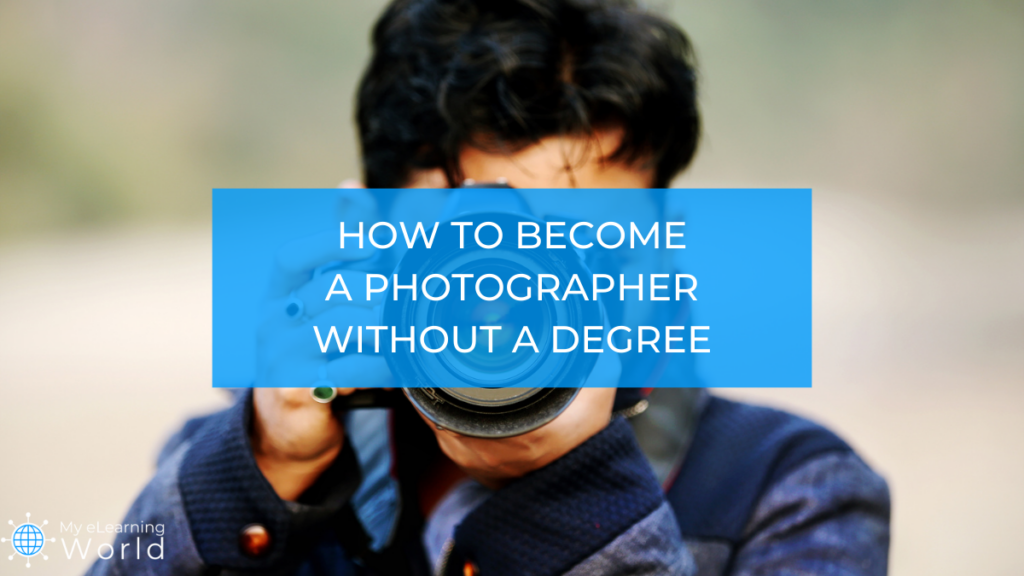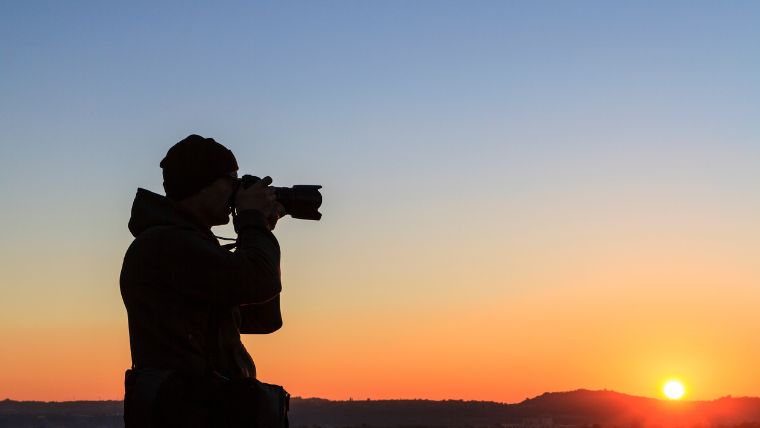Have you dreamed about pursuing a career as a photographer but can’t afford spending the money or time to get a degree from a university? Wondering how to become a photographer without a degree?
Many people take up photography as a way to capture memories of their travels, family, friends, or special events. Others use photography as a form of art. And still others use it as a way to make a living.
A photography career can be very rewarding, but it is not always easy to get started.
One of the biggest hurdles can be getting a degree in photography.
But did you know that you can actually become a photographer without a degree?
Thanks to online learning platforms like Skillshare, it’s now possible to get the training you need to start a career in photography from anywhere in the world — all without going to college.
Here’s everything you need to know about how to become a photographer without a degree…
Disclosure: Some of the links in this article are affiliate links, meaning at no additional cost for you, we might get a commission if you click the link and purchase.
What is a Photographer?
A photographer is someone who takes photographs. They can use a digital camera, film camera, or even a smartphone to capture images. Some photographers work in studios while others may travel to different locations to take pictures.
There are many different types of photography, such as landscape, portrait, product, food, event, and wedding photography.
And within each type of photography, there are different sub-genres. For example, portrait photographers may specialize in family portraits, senior portraits, or newborn photography.
So, a typical work day for a photographer may involve meeting clients, scouting locations, taking pictures, editing photos, and delivering final products.
What Skills Do You Need to Become a Photographer?
It’s not as easy as it looks to succeed as a photographer. Without certain skill sets, your career as a photographer will not be a very successful one. Here are the essential skills needed to become a good photographer:
- Technical skills. Knowledge of the technical aspects of photography is essential for any photographer. This includes an understanding of exposure, aperture, shutter speed, ISO, lighting, and composition. Also, photographers frequently use software for photo editing and manipulation. So, basic skills in Adobe Photoshop, Lightroom, or other photo-editing software are a must. Simply put, you need to have actual photography skills to succeed in this business.
- Creativity. Photography is an art form. And like all artists, photographers need to have a good sense of creativity to be successful. This includes an eye for composition, color, and light. It’s also important to be able to see the world from a different perspective and to find the beauty in everyday objects and scenes. For example, a good photographer can take an ordinary subject and make it look extraordinary through their use of composition, lighting, and angle.
- Attention to Detail. Being meticulous in capturing and editing images, paying attention to small elements that can make a big difference. It’s also important to pay attention to the technical aspects of photography, such as shutter speed, aperture, ISO settings, and more.
- Patience. Waiting for the perfect moment, dealing with challenging lighting conditions, and being patient during post-processing is one of the most underrated photography skills.
- People skills. A lot of photography involves people. When you’re taking portraits, wedding photos, or event photos, for instance, you’ll need to be able to interact with your subjects in a way that makes them feel comfortable. This means having good communication skills and being able to put people at ease. It also means being able to take direction well, as many clients will have specific ideas about what they want from a photo shoot.
- Business skills. If you want to be a professional photographer, you’ll need to know how to run a photography business. This means having basic marketing and sales skills, as well as knowing how to manage your finances, schedule appointments, and deliver products or services to clients. It’s also important to be proactive in promoting your photography business. This may involve creating a website, setting up social media accounts, and attending local events or trade shows. Even if you prefer to work for a company instead of working for yourself, you still need to know how to market your skills and sell yourself to potential employers.
- Collaboration. In many cases, photographers work with other professionals such as art directors, graphic designers, hair stylists, makeup artists, and wardrobe stylists. So, it’s important to be able to collaborate well with others. This means being able to take direction well, being flexible, and being able to compromise when necessary. For example, if you’re working on a big project with a team of other professionals, you may need to be willing to make some changes to your original vision to accommodate the needs of the project.
- Continuous Learning. Staying up-to-date with the latest photography trends, techniques, and software advancements through workshops, courses, and self-study is very important in the photography industry. Staying informed about new technologies and innovative approaches to photography can keep you ahead of the competition.
A Step-by-Step Guide to Becoming a Photographer Without a Degree
So how does one avoid the hassle of a 4-year photography degree and the enormous student debt that comes with it?
Here’s a step-by-step guide to becoming a photographer without a degree:
1. Sign Up for Photography Classes
 Skillshare
Skillshare
Skillshare is the ultimate website for learning just about anything imaginable. You can explore 30,000+ online classes across countless categories, from business to hobbies and more.
One way to learn photography is to sign up for online classes you can take from home on your own schedule.
Online photography classes will give you a basic understanding of the technical aspects of photography. If you’re serious about becoming a photographer, take courses about photography, lighting, and photo editing software.
Of course, there are tons of online courses out there, and not all of them are worth your time or money. In fact, some courses out there are so bad they’ll do more harm than good.
An online learning platforms like Skillshare (free 30-day trial) is a great place to take classes online. With over 34,000 courses in a wide range of topics, you can learn just about anything on Skillshare.
Skillshare offers a diverse selection of photography courses, catering to beginners, intermediate learners, and even advanced photographers.
Whether you’re just starting out or looking to refine specific skills, you can find courses tailored to your needs.
These courses cover various topics such as camera fundamentals, composition techniques, lighting, editing, and even specialized genres like portrait, landscape, or street photography.
Skillshare courses are designed to be highly accessible and flexible. As an online platform, Skillshare allows you to learn at your own pace and in your own time. The courses are broken down into digestible lessons, making it easy to follow along and practice the concepts at your own convenience. You can access the courses from anywhere, whether you prefer learning from the comfort of your home or while on the go.
Another great thing about Skillshare courses is they often offer practical assignments and projects, allowing you to apply the concepts you’ve learned in a hands-on manner. This practical approach helps reinforce your understanding and allows you to build a portfolio of work.
And of course, Skillshare offers an affordable learning option compared to traditional formal education/photography degree paths or in-person workshops. With an annual subscription fee, you gain access to a vast library of courses across various disciplines, including photography. This accessibility and cost-effectiveness make Skillshare an attractive choice for individuals looking to learn photography without breaking the bank.
Check out our Skillshare review for a whole lot more info on all that the platform offers.
Click here to try Skillshare free for one month.
2. Practice What You’re Learning
As you’re learning about photography, it’s actually very important to practice what you’re learning. The only way to truly master these concepts is to put them into practice yourself so you can learn from your mistakes as you go.
The best way to sharpen your photography skills is to get out there and start taking pictures.
If you don’t have a lot of experience, start by practicing with friends and family. As you get more comfortable, you can start charging for your services by signing up for freelance work or starting your own photography business.
You can also practice by entering photography contests or submitting your photos to online galleries. This is a great way to get feedback from other photographers and to see how your work stacks up against the competition.
Plus entering contests can also be a great way to win prizes, which can help you save money on expensive photography equipment.
3. Find a Mentor
If you want to become a successful photographer without getting a formal education at school, it’s helpful to find a mentor who can guide you and give you advice. A mentor is typically an experienced photographer who can offer guidance on everything from taking better pictures to running a photography business.
You can find mentors by reaching out to your local photography community or searching online. Once you find a mentor, be sure to take advantage of their knowledge and experience.
4. Put Together a Portfolio
A photographer without a portfolio is like a fish out of water. If you want to be taken seriously as a photographer, you need to have a portfolio that showcases your best work.
Your portfolio should include a mix of both personal and professional photos. As you’re putting together your portfolio, focus on quality over quantity. It’s better to have a few great shots than a bunch of mediocre ones.
Secure a domain name and hosting for your site with a provider like Squarespace or Bluehost. Then, you can install WordPress with one click, choose a theme/template for your site, and quickly be on your way to building your own photography portfolio in just minutes.
Once you have your portfolio set up, make sure to promote it online and offline. Hand out business cards with your portfolio URL, and include a link to your portfolio in your email signature.
A Final Word on Becoming a Photographer without a Degree
A photography career can be very rewarding, but it doesn’t come easy. If you’re serious about becoming a photographer, you need to put in the time and effort to learn the craft. The good news is that there are many different ways to do this.
While becoming a photographer doesn’t require a college degree, it does take some effort to learn the ropes.
Thankfully, there are some great online courses and resources that can help you become a successful photographer — all while saving you the exorbitant cost of getting a photography degree.
Do you have any questions on how to become a photographer without a degree? Let us know in the comments below!
- Elevating Your Virtual Presence: Why EMEET’s SmartCam S800 Stands Out in Modern Communication - 06/04/2025
- US Teachers Will Spend $3.35 Billion of Their Own Money on Classroom Expenses in 2025-25 School Year - 06/04/2025
- Report: Leveraging AI Tools Could Help US Teachers Avoid $43.4 Billion of Unpaid Overtime Work - 06/04/2025





it soooo full of information and useful .